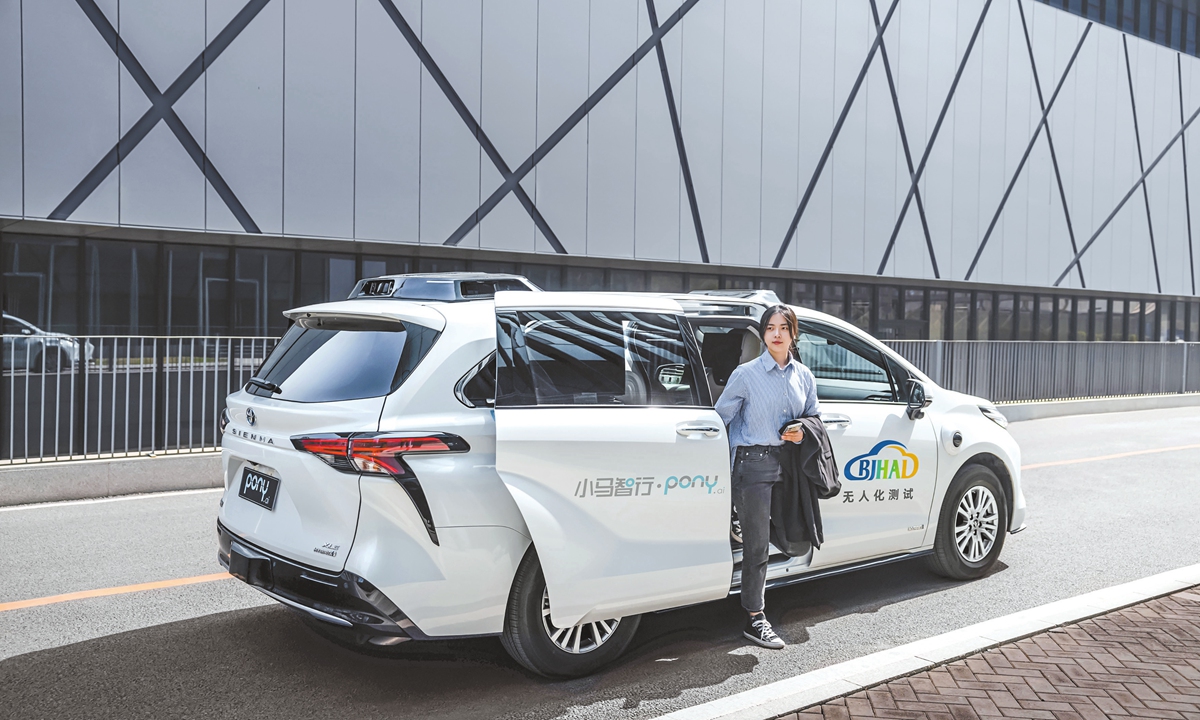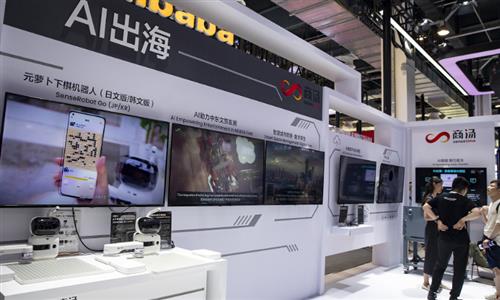Ambitious Chinese startups ready to challenge Tesla in domestic auto-pilot market
Innovation fuels competitiveness

A passenger steps out of a Pony.ai's autonomous vehicle. Photo: Courtesy of Pony.ai
Shenzhen-based Deeproute.ai, an emerging player in autonomous driving, announced Tuesday that it has secured $100 million in exclusive investment from a top domestic automaker. The company aims to use this funding to scale its advanced driver-assistance systems and capture more market share before Tesla's Full Self-Driving (FSD) technology enters China.
Zhou Guang, president of Deeproute.ai, told the Global Times on Tuesday that while competition is expected to be intense, the company has always welcomed Tesla's entry into China, adding that Tesla's performance has driven broader market adoption of smart technologies and advanced features, ultimately promoting mutual progress.
China represents a crucial battleground for autonomous driving companies due to the vast consumer market. According to Zhou, around 20,000 vehicles are currently equipped with the company's driver-assistance systems, and the company expects the number to reach 200,000 by 2025. Such ambitions are likely to intensify competition in China's autonomous driving market highlighting the growing rivalry between domestic and international automakers.
Each automaker has its strengths
On November 2, Pony.ai and BAIC Group signed a technology cooperation agreement in Beijing, aiming to develop Level 4 (L4) - the top level of autopilot technology - autonomous vehicles, with a goal of jointly advancing large-scale robotaxi deployments, according to a statement sent to the Global Times.
Pony.ai has offered autonomous ride-hailing services in Beijing, Shanghai, Guangzhou, and Shenzhen and now it provides paid autonomous rides in the four cities. As of August, it has accumulated over 35 million kilometers of autonomous driving test mileage.
In comparison with Tesla, a representative of Pony.ai told the Global Times on Tuesday that while Tesla's FSD performs well at L2, its L4 system faces limitations in detecting non-vehicle objects, especially on China's city roads with many pedestrians and bicycles, which could pose safety risks if objects are missed.
Apollo Go, Baidu's autonomous ride-hailing service, provided 899,000 rides in the second quarter in 2024, a 26 percent year-on-year increase. By July 28, 2024, total rides surpassed 7 million, according to the company.
On September 5, Tesla announced that the Chinese version of FSD is expected to launch in the first quarter of 2025, pending approval from regulators.
Tesla said its autopilot technology realizes a 10.5-fold increase in driving safety than that of regular vehicles, and the FSD system has accumulated over 3.2 billion kilometers of driving data globally as of the end of October, according to its social media account.
"Tesla's software is globally top-tier. Thanks to its large owner base, Tesla can continuously gather data, enabling rapid iterations of its autonomous driving technology once launched in China," Wu Shuocheng, a veteran automobile industry analyst, told the Global Times on Tuesday.
Wu pointed out that Tesla's core challenge lies in collecting essential geographic data and ensuring it is handled securely and in compliance with regulations.
While China's autonomous driving companies entered the market later they are rapidly catching up. "Their advantage is rooted in the vehicle-road-cloud system. The alignment of high-quality driverless cars, infrastructure and regulatory policies makes the commercial operation of autonomous vehicles in a safer and smoother way," Wu said.
Open market boosts development
"Currently, advanced autonomous driving is still in the experimental phase, with some regional commercialization. It will take a relatively long time before fully driverless cars are sold to individual consumers. Even Tesla needs to gain enough experience in the US before considering expanding into China," Cui Dongshu, secretary-general of the China Passenger Car Association, told the Global Times on Tuesday.
From January to June this year, 55.7 percent of new passenger vehicles in China were equipped with L2 autonomous driving systems, with 11 percent featuring navigation-assisted driving capabilities, according to data from China's Ministry of Industry and Information Technology (MIIT).
"China's market welcomes domestic companies, Tesla and other global autonomous driving companies, promoting the development of advanced technologies in compliance with regulations," Cui said.
"We're excited to see many companies advancing in autonomous driving research and application. It's great for the industry and pushes us to further refine our technology," the representative of Pony.ai said.
However, experts said that due to legislation on autonomous driving and societal and ethical considerations, large-scale commercialization will not surge in the next one or two years. It will require a longer period to standardize and develop in a stable manner.
China's intelligent connected vehicle industry is well-established, featuring a comprehensive system that includes core chips, sensors, computing platforms, chassis control, and cloud connectivity, Jin Zhuanglong, head of the MIIT said on October 17.
Over 50 cities nationwide have implemented road tests, with 32,000 kilometers of test roads made available, 10,000 kilometers of roads upgraded with smart technology, and more than 8,700 roadside units installed, according to Jin.
China is expected to become the world's largest autonomous driving market, with new car sales and mobility services generating over $500 billion in revenue by 2030, according to a McKinsey projection.




